Leadership, Management, and Operational Strategies at Tesco PLC
VerifiedAdded on 2020/06/06
|14
|3917
|66
Report
AI Summary
This report provides a detailed analysis of management and operations within Tesco PLC, exploring the roles and characteristics of leaders and managers. It delves into various leadership theories, including situational, systematic, and contingency leadership, and examines the functions of managers such as planning, organizing, directing, staffing, leading, and controlling. The report also covers key approaches to operations management, highlighting the importance of operations management in achieving business objectives and the impact of the business environment on operational decision-making. Furthermore, the report discusses the roles of leaders and managers in different situations and the factors influencing operational management and decision-making. Overall, the report offers a comprehensive overview of the strategic and operational aspects of Tesco PLC's business practices, providing valuable insights into leadership and management within the retail sector.
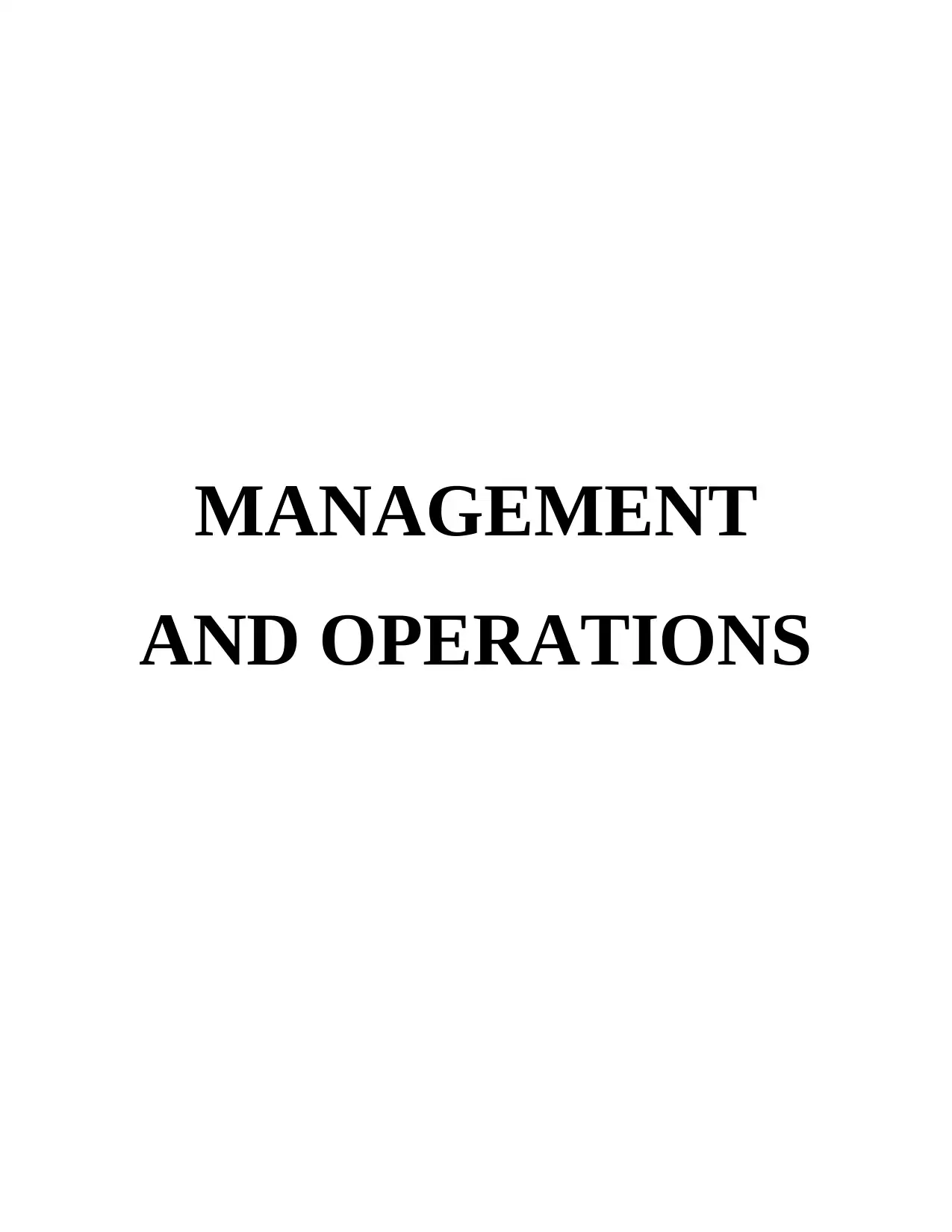
MANAGEMENT
AND OPERATIONS
AND OPERATIONS
Paraphrase This Document
Need a fresh take? Get an instant paraphrase of this document with our AI Paraphraser
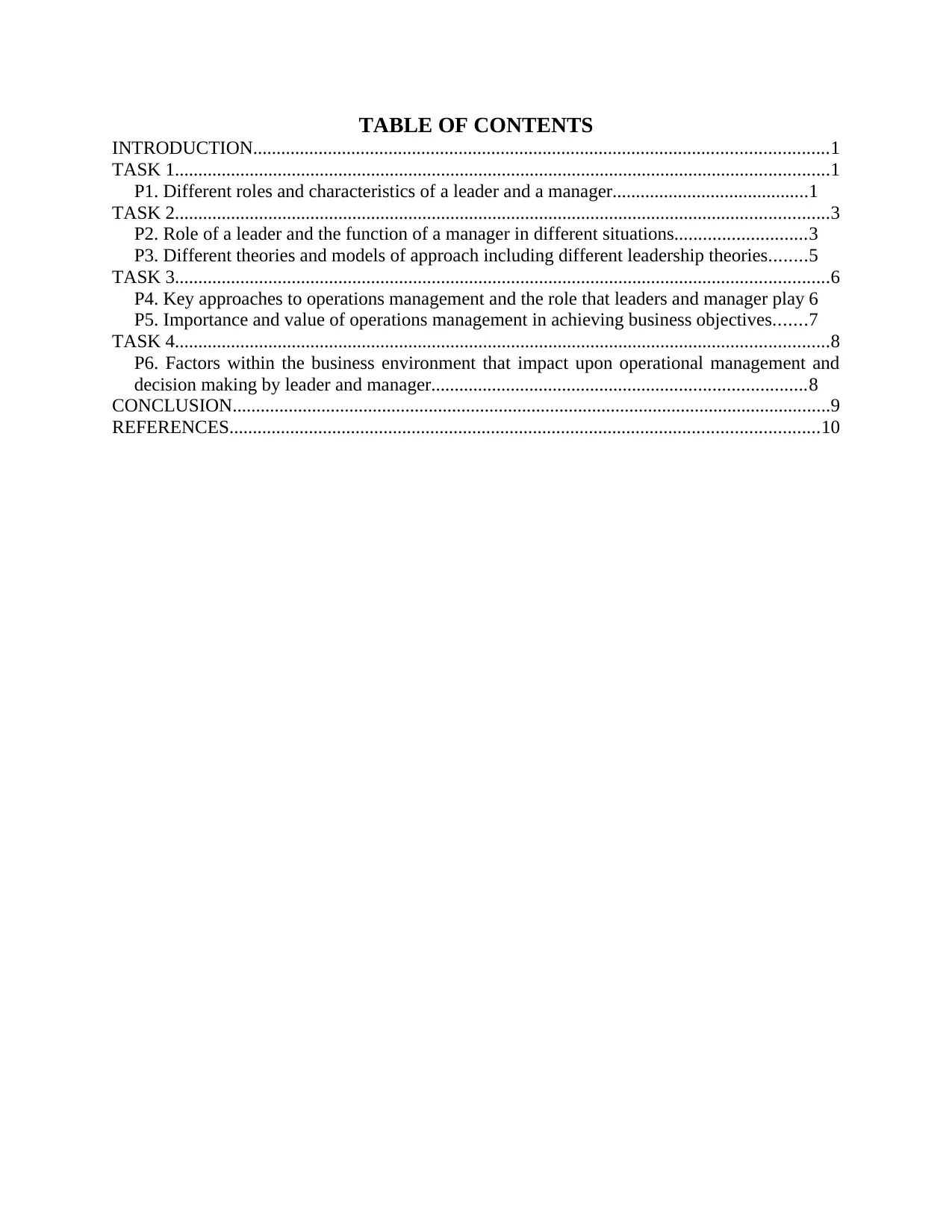
TABLE OF CONTENTS
INTRODUCTION...........................................................................................................................1
TASK 1............................................................................................................................................1
P1. Different roles and characteristics of a leader and a manager..........................................1
TASK 2............................................................................................................................................3
P2. Role of a leader and the function of a manager in different situations............................3
P3. Different theories and models of approach including different leadership theories........5
TASK 3............................................................................................................................................6
P4. Key approaches to operations management and the role that leaders and manager play 6
P5. Importance and value of operations management in achieving business objectives.......7
TASK 4............................................................................................................................................8
P6. Factors within the business environment that impact upon operational management and
decision making by leader and manager................................................................................8
CONCLUSION................................................................................................................................9
REFERENCES..............................................................................................................................10
INTRODUCTION...........................................................................................................................1
TASK 1............................................................................................................................................1
P1. Different roles and characteristics of a leader and a manager..........................................1
TASK 2............................................................................................................................................3
P2. Role of a leader and the function of a manager in different situations............................3
P3. Different theories and models of approach including different leadership theories........5
TASK 3............................................................................................................................................6
P4. Key approaches to operations management and the role that leaders and manager play 6
P5. Importance and value of operations management in achieving business objectives.......7
TASK 4............................................................................................................................................8
P6. Factors within the business environment that impact upon operational management and
decision making by leader and manager................................................................................8
CONCLUSION................................................................................................................................9
REFERENCES..............................................................................................................................10
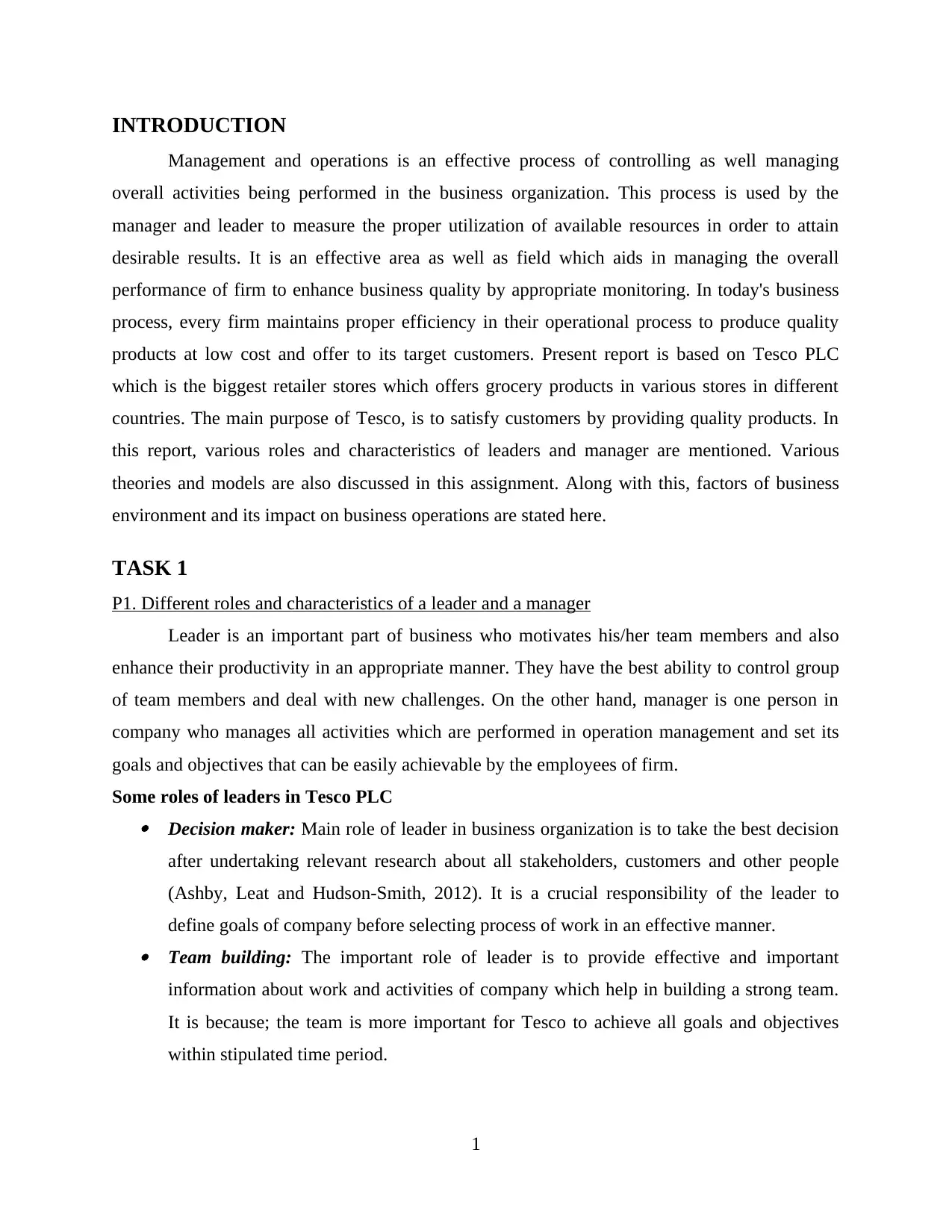
INTRODUCTION
Management and operations is an effective process of controlling as well managing
overall activities being performed in the business organization. This process is used by the
manager and leader to measure the proper utilization of available resources in order to attain
desirable results. It is an effective area as well as field which aids in managing the overall
performance of firm to enhance business quality by appropriate monitoring. In today's business
process, every firm maintains proper efficiency in their operational process to produce quality
products at low cost and offer to its target customers. Present report is based on Tesco PLC
which is the biggest retailer stores which offers grocery products in various stores in different
countries. The main purpose of Tesco, is to satisfy customers by providing quality products. In
this report, various roles and characteristics of leaders and manager are mentioned. Various
theories and models are also discussed in this assignment. Along with this, factors of business
environment and its impact on business operations are stated here.
TASK 1
P1. Different roles and characteristics of a leader and a manager
Leader is an important part of business who motivates his/her team members and also
enhance their productivity in an appropriate manner. They have the best ability to control group
of team members and deal with new challenges. On the other hand, manager is one person in
company who manages all activities which are performed in operation management and set its
goals and objectives that can be easily achievable by the employees of firm.
Some roles of leaders in Tesco PLC Decision maker: Main role of leader in business organization is to take the best decision
after undertaking relevant research about all stakeholders, customers and other people
(Ashby, Leat and Hudson-Smith, 2012). It is a crucial responsibility of the leader to
define goals of company before selecting process of work in an effective manner. Team building: The important role of leader is to provide effective and important
information about work and activities of company which help in building a strong team.
It is because; the team is more important for Tesco to achieve all goals and objectives
within stipulated time period.
1
Management and operations is an effective process of controlling as well managing
overall activities being performed in the business organization. This process is used by the
manager and leader to measure the proper utilization of available resources in order to attain
desirable results. It is an effective area as well as field which aids in managing the overall
performance of firm to enhance business quality by appropriate monitoring. In today's business
process, every firm maintains proper efficiency in their operational process to produce quality
products at low cost and offer to its target customers. Present report is based on Tesco PLC
which is the biggest retailer stores which offers grocery products in various stores in different
countries. The main purpose of Tesco, is to satisfy customers by providing quality products. In
this report, various roles and characteristics of leaders and manager are mentioned. Various
theories and models are also discussed in this assignment. Along with this, factors of business
environment and its impact on business operations are stated here.
TASK 1
P1. Different roles and characteristics of a leader and a manager
Leader is an important part of business who motivates his/her team members and also
enhance their productivity in an appropriate manner. They have the best ability to control group
of team members and deal with new challenges. On the other hand, manager is one person in
company who manages all activities which are performed in operation management and set its
goals and objectives that can be easily achievable by the employees of firm.
Some roles of leaders in Tesco PLC Decision maker: Main role of leader in business organization is to take the best decision
after undertaking relevant research about all stakeholders, customers and other people
(Ashby, Leat and Hudson-Smith, 2012). It is a crucial responsibility of the leader to
define goals of company before selecting process of work in an effective manner. Team building: The important role of leader is to provide effective and important
information about work and activities of company which help in building a strong team.
It is because; the team is more important for Tesco to achieve all goals and objectives
within stipulated time period.
1
⊘ This is a preview!⊘
Do you want full access?
Subscribe today to unlock all pages.

Trusted by 1+ million students worldwide
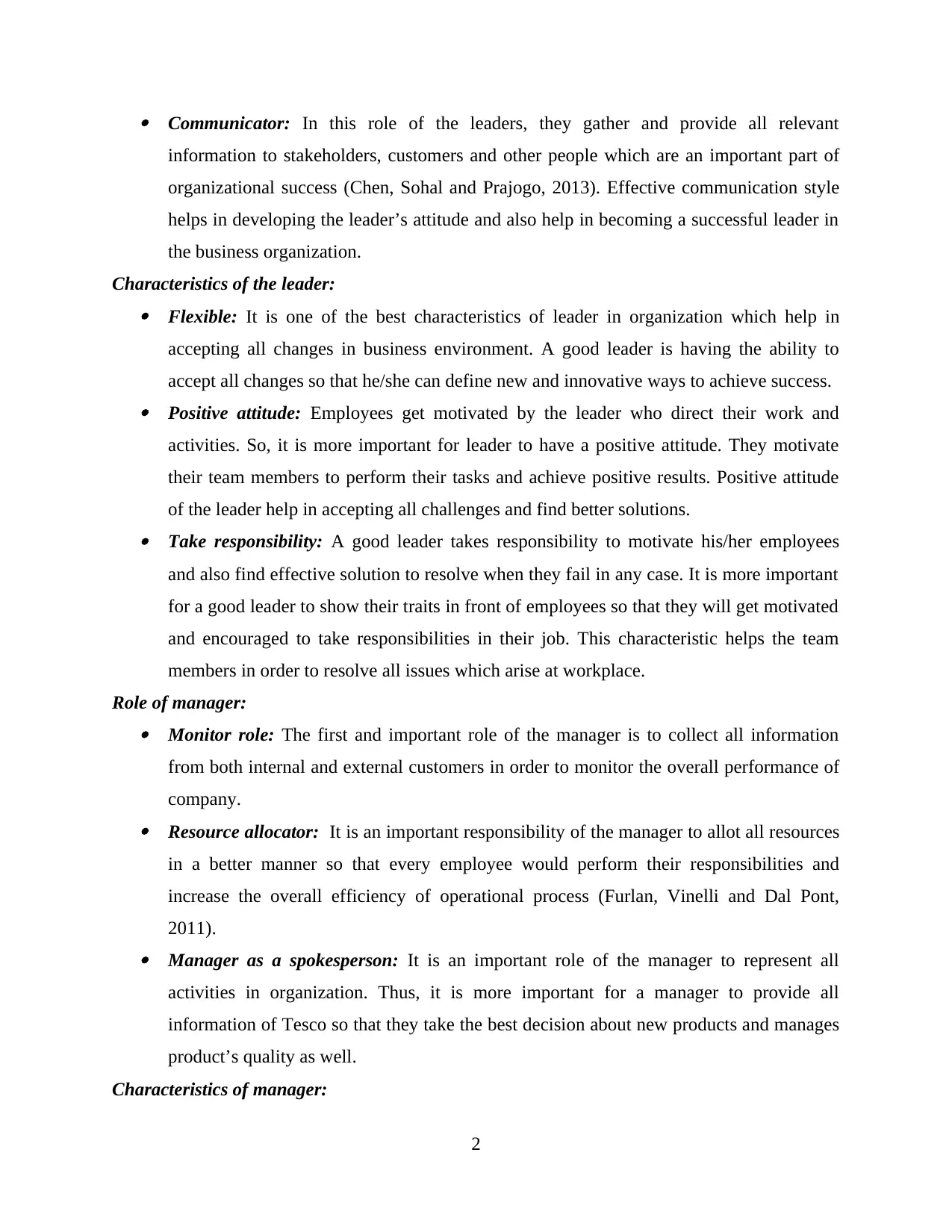
Communicator: In this role of the leaders, they gather and provide all relevant
information to stakeholders, customers and other people which are an important part of
organizational success (Chen, Sohal and Prajogo, 2013). Effective communication style
helps in developing the leader’s attitude and also help in becoming a successful leader in
the business organization.
Characteristics of the leader: Flexible: It is one of the best characteristics of leader in organization which help in
accepting all changes in business environment. A good leader is having the ability to
accept all changes so that he/she can define new and innovative ways to achieve success. Positive attitude: Employees get motivated by the leader who direct their work and
activities. So, it is more important for leader to have a positive attitude. They motivate
their team members to perform their tasks and achieve positive results. Positive attitude
of the leader help in accepting all challenges and find better solutions. Take responsibility: A good leader takes responsibility to motivate his/her employees
and also find effective solution to resolve when they fail in any case. It is more important
for a good leader to show their traits in front of employees so that they will get motivated
and encouraged to take responsibilities in their job. This characteristic helps the team
members in order to resolve all issues which arise at workplace.
Role of manager: Monitor role: The first and important role of the manager is to collect all information
from both internal and external customers in order to monitor the overall performance of
company. Resource allocator: It is an important responsibility of the manager to allot all resources
in a better manner so that every employee would perform their responsibilities and
increase the overall efficiency of operational process (Furlan, Vinelli and Dal Pont,
2011). Manager as a spokesperson: It is an important role of the manager to represent all
activities in organization. Thus, it is more important for a manager to provide all
information of Tesco so that they take the best decision about new products and manages
product’s quality as well.
Characteristics of manager:
2
information to stakeholders, customers and other people which are an important part of
organizational success (Chen, Sohal and Prajogo, 2013). Effective communication style
helps in developing the leader’s attitude and also help in becoming a successful leader in
the business organization.
Characteristics of the leader: Flexible: It is one of the best characteristics of leader in organization which help in
accepting all changes in business environment. A good leader is having the ability to
accept all changes so that he/she can define new and innovative ways to achieve success. Positive attitude: Employees get motivated by the leader who direct their work and
activities. So, it is more important for leader to have a positive attitude. They motivate
their team members to perform their tasks and achieve positive results. Positive attitude
of the leader help in accepting all challenges and find better solutions. Take responsibility: A good leader takes responsibility to motivate his/her employees
and also find effective solution to resolve when they fail in any case. It is more important
for a good leader to show their traits in front of employees so that they will get motivated
and encouraged to take responsibilities in their job. This characteristic helps the team
members in order to resolve all issues which arise at workplace.
Role of manager: Monitor role: The first and important role of the manager is to collect all information
from both internal and external customers in order to monitor the overall performance of
company. Resource allocator: It is an important responsibility of the manager to allot all resources
in a better manner so that every employee would perform their responsibilities and
increase the overall efficiency of operational process (Furlan, Vinelli and Dal Pont,
2011). Manager as a spokesperson: It is an important role of the manager to represent all
activities in organization. Thus, it is more important for a manager to provide all
information of Tesco so that they take the best decision about new products and manages
product’s quality as well.
Characteristics of manager:
2
Paraphrase This Document
Need a fresh take? Get an instant paraphrase of this document with our AI Paraphraser
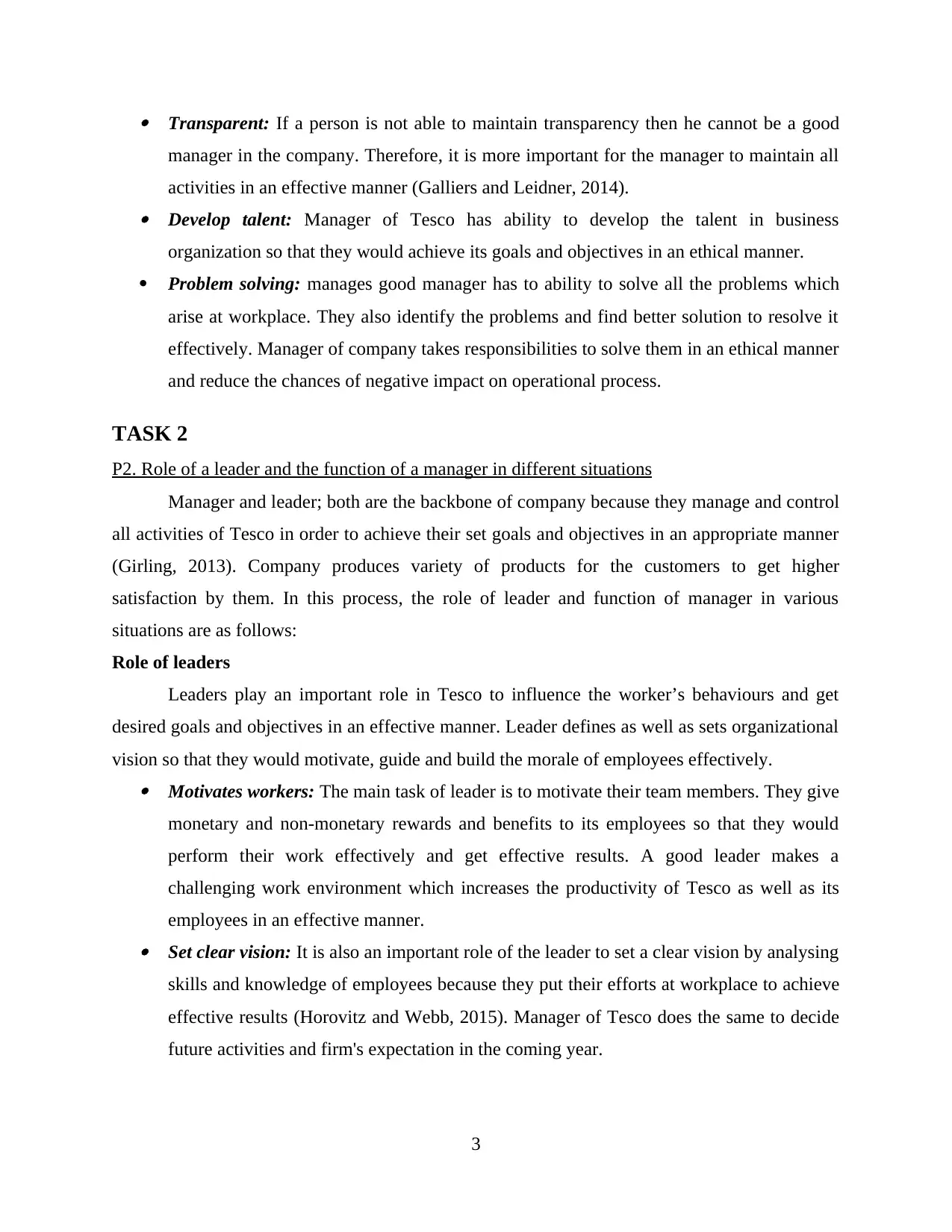
Transparent: If a person is not able to maintain transparency then he cannot be a good
manager in the company. Therefore, it is more important for the manager to maintain all
activities in an effective manner (Galliers and Leidner, 2014). Develop talent: Manager of Tesco has ability to develop the talent in business
organization so that they would achieve its goals and objectives in an ethical manner.
Problem solving: manages good manager has to ability to solve all the problems which
arise at workplace. They also identify the problems and find better solution to resolve it
effectively. Manager of company takes responsibilities to solve them in an ethical manner
and reduce the chances of negative impact on operational process.
TASK 2
P2. Role of a leader and the function of a manager in different situations
Manager and leader; both are the backbone of company because they manage and control
all activities of Tesco in order to achieve their set goals and objectives in an appropriate manner
(Girling, 2013). Company produces variety of products for the customers to get higher
satisfaction by them. In this process, the role of leader and function of manager in various
situations are as follows:
Role of leaders
Leaders play an important role in Tesco to influence the worker’s behaviours and get
desired goals and objectives in an effective manner. Leader defines as well as sets organizational
vision so that they would motivate, guide and build the morale of employees effectively. Motivates workers: The main task of leader is to motivate their team members. They give
monetary and non-monetary rewards and benefits to its employees so that they would
perform their work effectively and get effective results. A good leader makes a
challenging work environment which increases the productivity of Tesco as well as its
employees in an effective manner. Set clear vision: It is also an important role of the leader to set a clear vision by analysing
skills and knowledge of employees because they put their efforts at workplace to achieve
effective results (Horovitz and Webb, 2015). Manager of Tesco does the same to decide
future activities and firm's expectation in the coming year.
3
manager in the company. Therefore, it is more important for the manager to maintain all
activities in an effective manner (Galliers and Leidner, 2014). Develop talent: Manager of Tesco has ability to develop the talent in business
organization so that they would achieve its goals and objectives in an ethical manner.
Problem solving: manages good manager has to ability to solve all the problems which
arise at workplace. They also identify the problems and find better solution to resolve it
effectively. Manager of company takes responsibilities to solve them in an ethical manner
and reduce the chances of negative impact on operational process.
TASK 2
P2. Role of a leader and the function of a manager in different situations
Manager and leader; both are the backbone of company because they manage and control
all activities of Tesco in order to achieve their set goals and objectives in an appropriate manner
(Girling, 2013). Company produces variety of products for the customers to get higher
satisfaction by them. In this process, the role of leader and function of manager in various
situations are as follows:
Role of leaders
Leaders play an important role in Tesco to influence the worker’s behaviours and get
desired goals and objectives in an effective manner. Leader defines as well as sets organizational
vision so that they would motivate, guide and build the morale of employees effectively. Motivates workers: The main task of leader is to motivate their team members. They give
monetary and non-monetary rewards and benefits to its employees so that they would
perform their work effectively and get effective results. A good leader makes a
challenging work environment which increases the productivity of Tesco as well as its
employees in an effective manner. Set clear vision: It is also an important role of the leader to set a clear vision by analysing
skills and knowledge of employees because they put their efforts at workplace to achieve
effective results (Horovitz and Webb, 2015). Manager of Tesco does the same to decide
future activities and firm's expectation in the coming year.
3
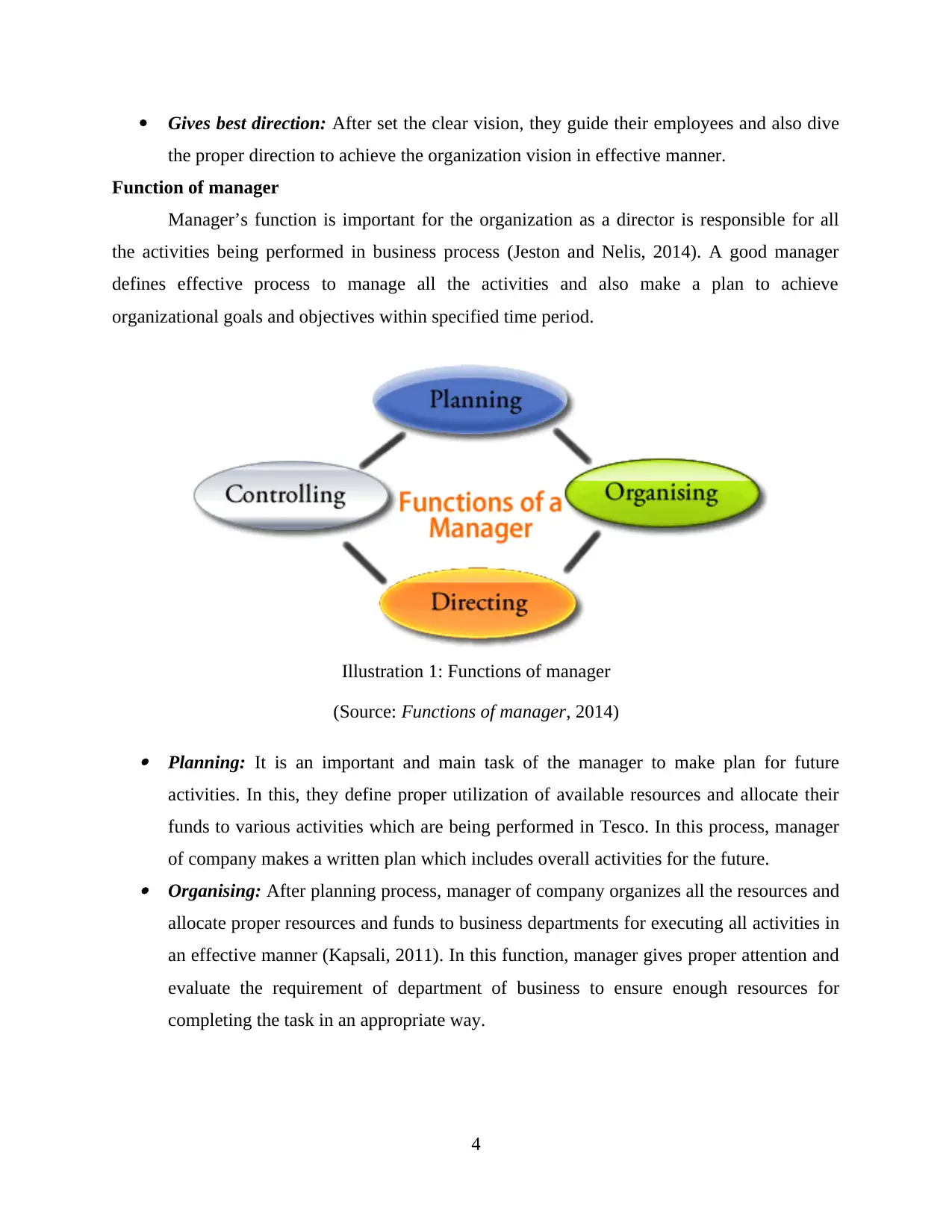
Gives best direction: After set the clear vision, they guide their employees and also dive
the proper direction to achieve the organization vision in effective manner.
Function of manager
Manager’s function is important for the organization as a director is responsible for all
the activities being performed in business process (Jeston and Nelis, 2014). A good manager
defines effective process to manage all the activities and also make a plan to achieve
organizational goals and objectives within specified time period.
(Source: Functions of manager, 2014)
Planning: It is an important and main task of the manager to make plan for future
activities. In this, they define proper utilization of available resources and allocate their
funds to various activities which are being performed in Tesco. In this process, manager
of company makes a written plan which includes overall activities for the future. Organising: After planning process, manager of company organizes all the resources and
allocate proper resources and funds to business departments for executing all activities in
an effective manner (Kapsali, 2011). In this function, manager gives proper attention and
evaluate the requirement of department of business to ensure enough resources for
completing the task in an appropriate way.
4
Illustration 1: Functions of manager
the proper direction to achieve the organization vision in effective manner.
Function of manager
Manager’s function is important for the organization as a director is responsible for all
the activities being performed in business process (Jeston and Nelis, 2014). A good manager
defines effective process to manage all the activities and also make a plan to achieve
organizational goals and objectives within specified time period.
(Source: Functions of manager, 2014)
Planning: It is an important and main task of the manager to make plan for future
activities. In this, they define proper utilization of available resources and allocate their
funds to various activities which are being performed in Tesco. In this process, manager
of company makes a written plan which includes overall activities for the future. Organising: After planning process, manager of company organizes all the resources and
allocate proper resources and funds to business departments for executing all activities in
an effective manner (Kapsali, 2011). In this function, manager gives proper attention and
evaluate the requirement of department of business to ensure enough resources for
completing the task in an appropriate way.
4
Illustration 1: Functions of manager
⊘ This is a preview!⊘
Do you want full access?
Subscribe today to unlock all pages.

Trusted by 1+ million students worldwide
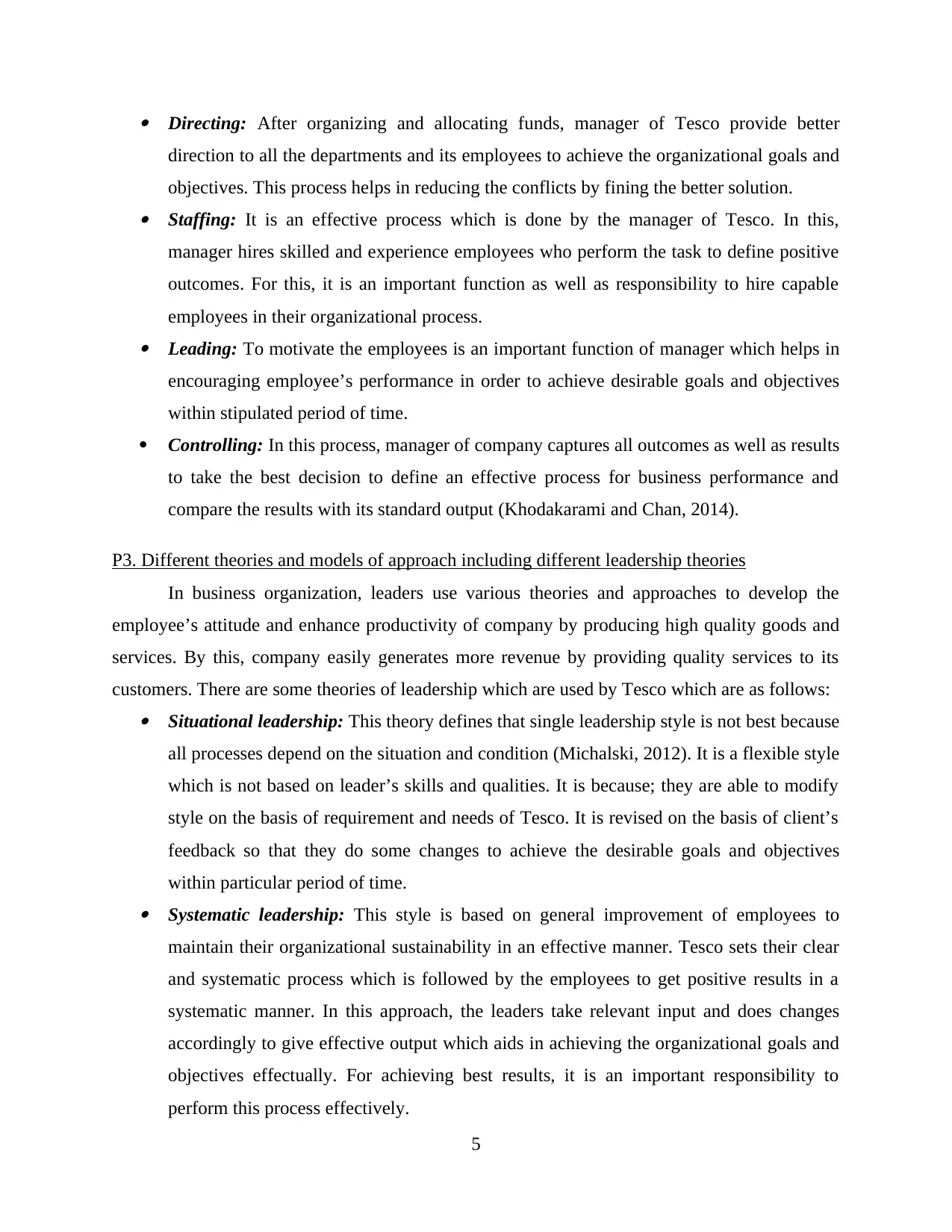
Directing: After organizing and allocating funds, manager of Tesco provide better
direction to all the departments and its employees to achieve the organizational goals and
objectives. This process helps in reducing the conflicts by fining the better solution. Staffing: It is an effective process which is done by the manager of Tesco. In this,
manager hires skilled and experience employees who perform the task to define positive
outcomes. For this, it is an important function as well as responsibility to hire capable
employees in their organizational process. Leading: To motivate the employees is an important function of manager which helps in
encouraging employee’s performance in order to achieve desirable goals and objectives
within stipulated period of time.
Controlling: In this process, manager of company captures all outcomes as well as results
to take the best decision to define an effective process for business performance and
compare the results with its standard output (Khodakarami and Chan, 2014).
P3. Different theories and models of approach including different leadership theories
In business organization, leaders use various theories and approaches to develop the
employee’s attitude and enhance productivity of company by producing high quality goods and
services. By this, company easily generates more revenue by providing quality services to its
customers. There are some theories of leadership which are used by Tesco which are as follows: Situational leadership: This theory defines that single leadership style is not best because
all processes depend on the situation and condition (Michalski, 2012). It is a flexible style
which is not based on leader’s skills and qualities. It is because; they are able to modify
style on the basis of requirement and needs of Tesco. It is revised on the basis of client’s
feedback so that they do some changes to achieve the desirable goals and objectives
within particular period of time. Systematic leadership: This style is based on general improvement of employees to
maintain their organizational sustainability in an effective manner. Tesco sets their clear
and systematic process which is followed by the employees to get positive results in a
systematic manner. In this approach, the leaders take relevant input and does changes
accordingly to give effective output which aids in achieving the organizational goals and
objectives effectually. For achieving best results, it is an important responsibility to
perform this process effectively.
5
direction to all the departments and its employees to achieve the organizational goals and
objectives. This process helps in reducing the conflicts by fining the better solution. Staffing: It is an effective process which is done by the manager of Tesco. In this,
manager hires skilled and experience employees who perform the task to define positive
outcomes. For this, it is an important function as well as responsibility to hire capable
employees in their organizational process. Leading: To motivate the employees is an important function of manager which helps in
encouraging employee’s performance in order to achieve desirable goals and objectives
within stipulated period of time.
Controlling: In this process, manager of company captures all outcomes as well as results
to take the best decision to define an effective process for business performance and
compare the results with its standard output (Khodakarami and Chan, 2014).
P3. Different theories and models of approach including different leadership theories
In business organization, leaders use various theories and approaches to develop the
employee’s attitude and enhance productivity of company by producing high quality goods and
services. By this, company easily generates more revenue by providing quality services to its
customers. There are some theories of leadership which are used by Tesco which are as follows: Situational leadership: This theory defines that single leadership style is not best because
all processes depend on the situation and condition (Michalski, 2012). It is a flexible style
which is not based on leader’s skills and qualities. It is because; they are able to modify
style on the basis of requirement and needs of Tesco. It is revised on the basis of client’s
feedback so that they do some changes to achieve the desirable goals and objectives
within particular period of time. Systematic leadership: This style is based on general improvement of employees to
maintain their organizational sustainability in an effective manner. Tesco sets their clear
and systematic process which is followed by the employees to get positive results in a
systematic manner. In this approach, the leaders take relevant input and does changes
accordingly to give effective output which aids in achieving the organizational goals and
objectives effectually. For achieving best results, it is an important responsibility to
perform this process effectively.
5
Paraphrase This Document
Need a fresh take? Get an instant paraphrase of this document with our AI Paraphraser
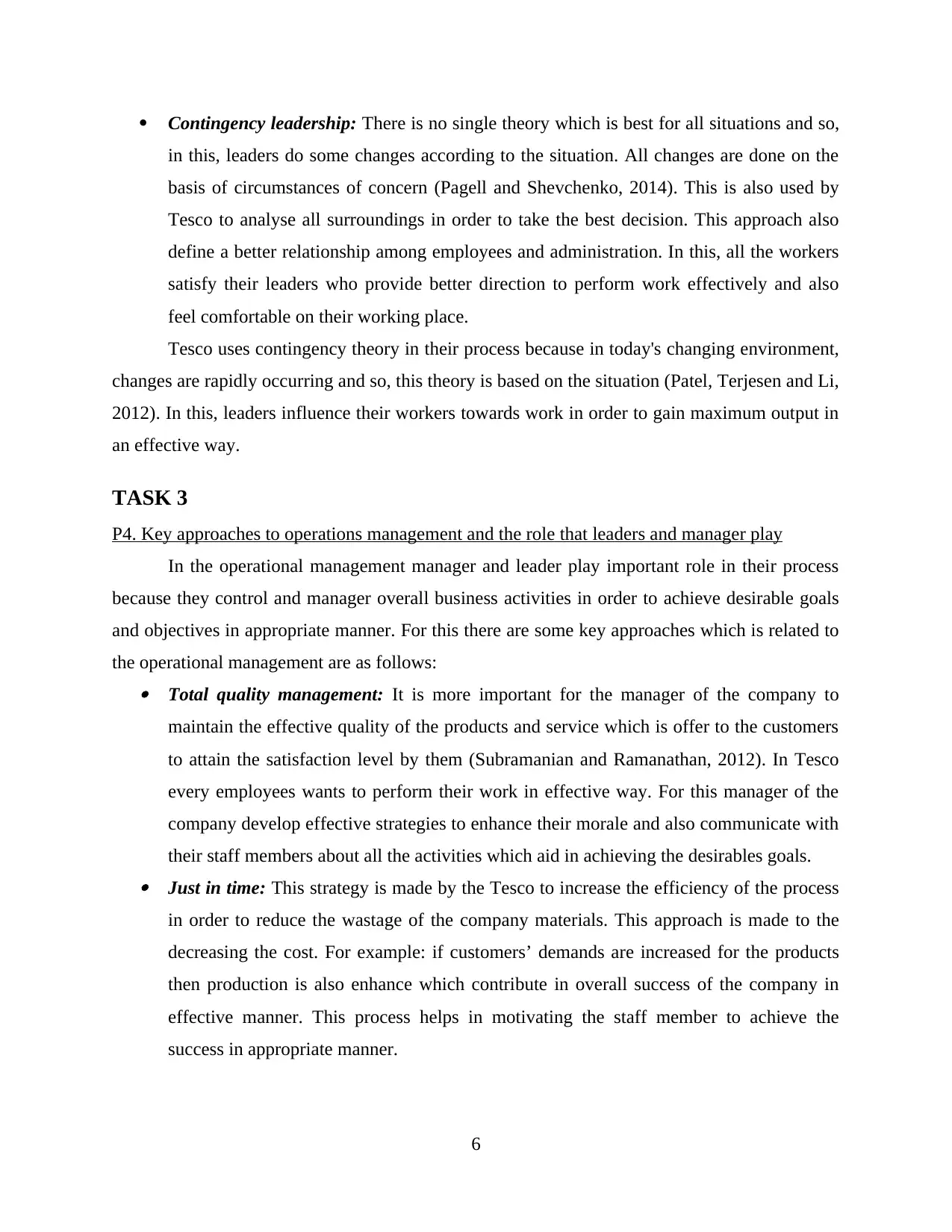
Contingency leadership: There is no single theory which is best for all situations and so,
in this, leaders do some changes according to the situation. All changes are done on the
basis of circumstances of concern (Pagell and Shevchenko, 2014). This is also used by
Tesco to analyse all surroundings in order to take the best decision. This approach also
define a better relationship among employees and administration. In this, all the workers
satisfy their leaders who provide better direction to perform work effectively and also
feel comfortable on their working place.
Tesco uses contingency theory in their process because in today's changing environment,
changes are rapidly occurring and so, this theory is based on the situation (Patel, Terjesen and Li,
2012). In this, leaders influence their workers towards work in order to gain maximum output in
an effective way.
TASK 3
P4. Key approaches to operations management and the role that leaders and manager play
In the operational management manager and leader play important role in their process
because they control and manager overall business activities in order to achieve desirable goals
and objectives in appropriate manner. For this there are some key approaches which is related to
the operational management are as follows: Total quality management: It is more important for the manager of the company to
maintain the effective quality of the products and service which is offer to the customers
to attain the satisfaction level by them (Subramanian and Ramanathan, 2012). In Tesco
every employees wants to perform their work in effective way. For this manager of the
company develop effective strategies to enhance their morale and also communicate with
their staff members about all the activities which aid in achieving the desirables goals. Just in time: This strategy is made by the Tesco to increase the efficiency of the process
in order to reduce the wastage of the company materials. This approach is made to the
decreasing the cost. For example: if customers’ demands are increased for the products
then production is also enhance which contribute in overall success of the company in
effective manner. This process helps in motivating the staff member to achieve the
success in appropriate manner.
6
in this, leaders do some changes according to the situation. All changes are done on the
basis of circumstances of concern (Pagell and Shevchenko, 2014). This is also used by
Tesco to analyse all surroundings in order to take the best decision. This approach also
define a better relationship among employees and administration. In this, all the workers
satisfy their leaders who provide better direction to perform work effectively and also
feel comfortable on their working place.
Tesco uses contingency theory in their process because in today's changing environment,
changes are rapidly occurring and so, this theory is based on the situation (Patel, Terjesen and Li,
2012). In this, leaders influence their workers towards work in order to gain maximum output in
an effective way.
TASK 3
P4. Key approaches to operations management and the role that leaders and manager play
In the operational management manager and leader play important role in their process
because they control and manager overall business activities in order to achieve desirable goals
and objectives in appropriate manner. For this there are some key approaches which is related to
the operational management are as follows: Total quality management: It is more important for the manager of the company to
maintain the effective quality of the products and service which is offer to the customers
to attain the satisfaction level by them (Subramanian and Ramanathan, 2012). In Tesco
every employees wants to perform their work in effective way. For this manager of the
company develop effective strategies to enhance their morale and also communicate with
their staff members about all the activities which aid in achieving the desirables goals. Just in time: This strategy is made by the Tesco to increase the efficiency of the process
in order to reduce the wastage of the company materials. This approach is made to the
decreasing the cost. For example: if customers’ demands are increased for the products
then production is also enhance which contribute in overall success of the company in
effective manner. This process helps in motivating the staff member to achieve the
success in appropriate manner.
6
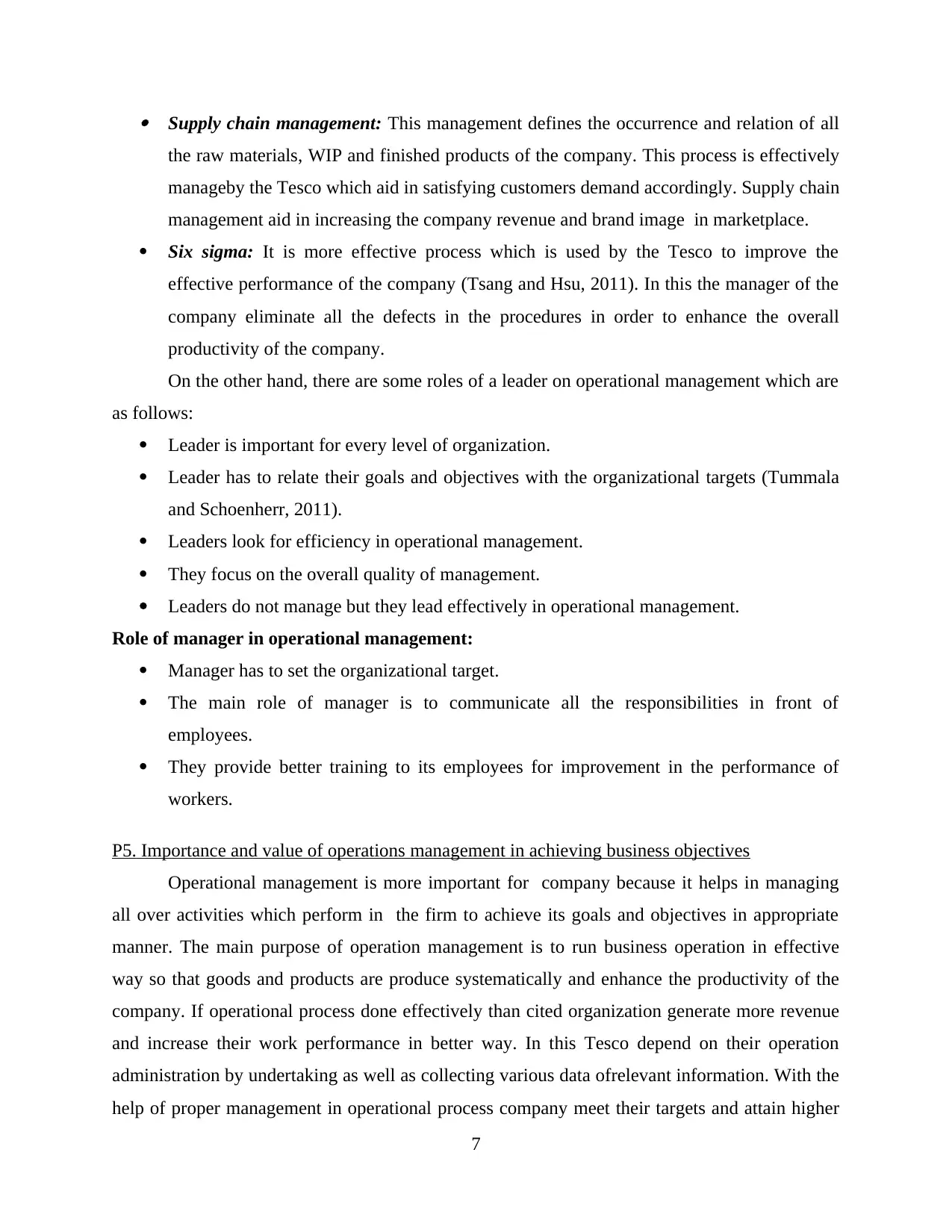
Supply chain management: This management defines the occurrence and relation of all
the raw materials, WIP and finished products of the company. This process is effectively
manageby the Tesco which aid in satisfying customers demand accordingly. Supply chain
management aid in increasing the company revenue and brand image in marketplace.
Six sigma: It is more effective process which is used by the Tesco to improve the
effective performance of the company (Tsang and Hsu, 2011). In this the manager of the
company eliminate all the defects in the procedures in order to enhance the overall
productivity of the company.
On the other hand, there are some roles of a leader on operational management which are
as follows:
Leader is important for every level of organization.
Leader has to relate their goals and objectives with the organizational targets (Tummala
and Schoenherr, 2011).
Leaders look for efficiency in operational management.
They focus on the overall quality of management.
Leaders do not manage but they lead effectively in operational management.
Role of manager in operational management:
Manager has to set the organizational target.
The main role of manager is to communicate all the responsibilities in front of
employees.
They provide better training to its employees for improvement in the performance of
workers.
P5. Importance and value of operations management in achieving business objectives
Operational management is more important for company because it helps in managing
all over activities which perform in the firm to achieve its goals and objectives in appropriate
manner. The main purpose of operation management is to run business operation in effective
way so that goods and products are produce systematically and enhance the productivity of the
company. If operational process done effectively than cited organization generate more revenue
and increase their work performance in better way. In this Tesco depend on their operation
administration by undertaking as well as collecting various data ofrelevant information. With the
help of proper management in operational process company meet their targets and attain higher
7
the raw materials, WIP and finished products of the company. This process is effectively
manageby the Tesco which aid in satisfying customers demand accordingly. Supply chain
management aid in increasing the company revenue and brand image in marketplace.
Six sigma: It is more effective process which is used by the Tesco to improve the
effective performance of the company (Tsang and Hsu, 2011). In this the manager of the
company eliminate all the defects in the procedures in order to enhance the overall
productivity of the company.
On the other hand, there are some roles of a leader on operational management which are
as follows:
Leader is important for every level of organization.
Leader has to relate their goals and objectives with the organizational targets (Tummala
and Schoenherr, 2011).
Leaders look for efficiency in operational management.
They focus on the overall quality of management.
Leaders do not manage but they lead effectively in operational management.
Role of manager in operational management:
Manager has to set the organizational target.
The main role of manager is to communicate all the responsibilities in front of
employees.
They provide better training to its employees for improvement in the performance of
workers.
P5. Importance and value of operations management in achieving business objectives
Operational management is more important for company because it helps in managing
all over activities which perform in the firm to achieve its goals and objectives in appropriate
manner. The main purpose of operation management is to run business operation in effective
way so that goods and products are produce systematically and enhance the productivity of the
company. If operational process done effectively than cited organization generate more revenue
and increase their work performance in better way. In this Tesco depend on their operation
administration by undertaking as well as collecting various data ofrelevant information. With the
help of proper management in operational process company meet their targets and attain higher
7
⊘ This is a preview!⊘
Do you want full access?
Subscribe today to unlock all pages.

Trusted by 1+ million students worldwide
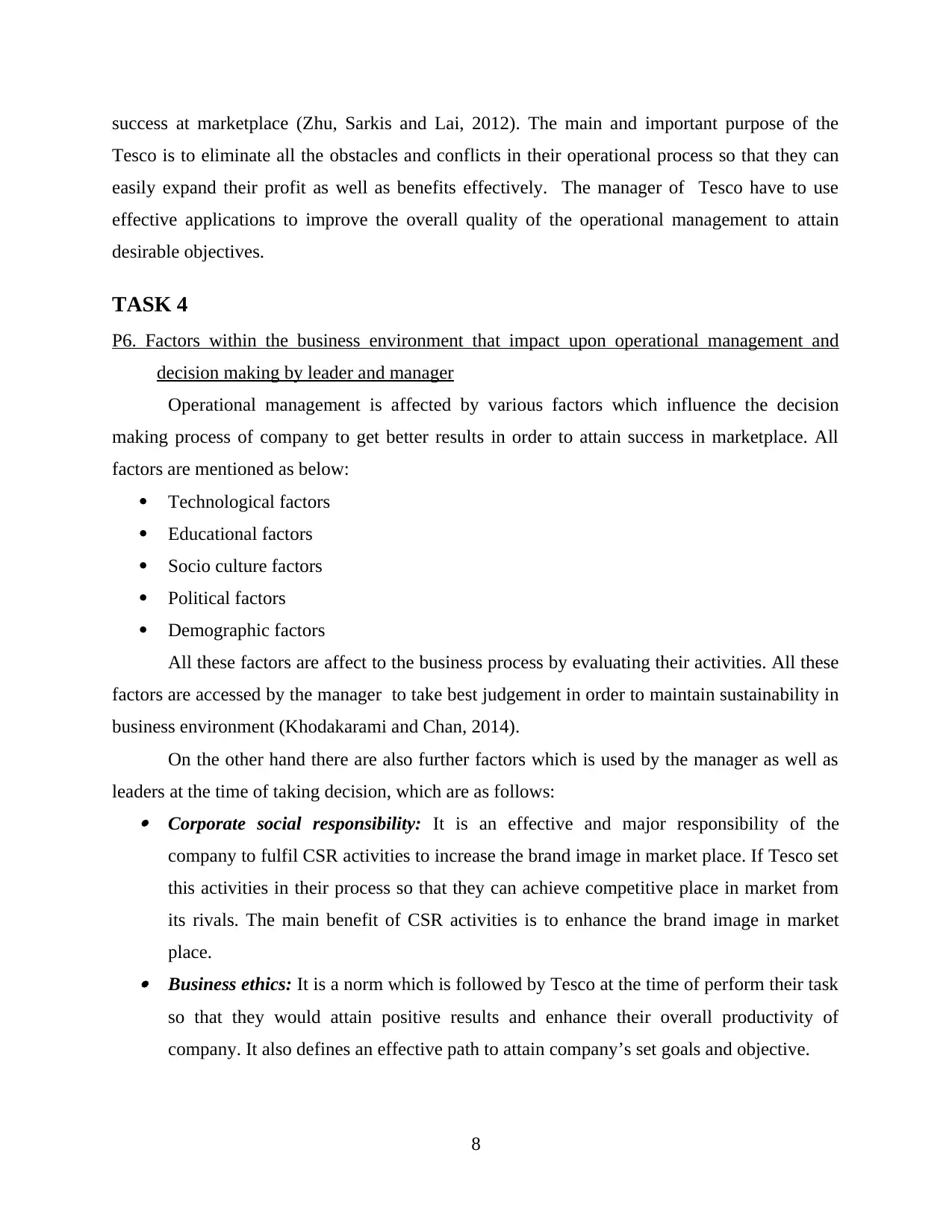
success at marketplace (Zhu, Sarkis and Lai, 2012). The main and important purpose of the
Tesco is to eliminate all the obstacles and conflicts in their operational process so that they can
easily expand their profit as well as benefits effectively. The manager of Tesco have to use
effective applications to improve the overall quality of the operational management to attain
desirable objectives.
TASK 4
P6. Factors within the business environment that impact upon operational management and
decision making by leader and manager
Operational management is affected by various factors which influence the decision
making process of company to get better results in order to attain success in marketplace. All
factors are mentioned as below:
Technological factors
Educational factors
Socio culture factors
Political factors
Demographic factors
All these factors are affect to the business process by evaluating their activities. All these
factors are accessed by the manager to take best judgement in order to maintain sustainability in
business environment (Khodakarami and Chan, 2014).
On the other hand there are also further factors which is used by the manager as well as
leaders at the time of taking decision, which are as follows: Corporate social responsibility: It is an effective and major responsibility of the
company to fulfil CSR activities to increase the brand image in market place. If Tesco set
this activities in their process so that they can achieve competitive place in market from
its rivals. The main benefit of CSR activities is to enhance the brand image in market
place. Business ethics: It is a norm which is followed by Tesco at the time of perform their task
so that they would attain positive results and enhance their overall productivity of
company. It also defines an effective path to attain company’s set goals and objective.
8
Tesco is to eliminate all the obstacles and conflicts in their operational process so that they can
easily expand their profit as well as benefits effectively. The manager of Tesco have to use
effective applications to improve the overall quality of the operational management to attain
desirable objectives.
TASK 4
P6. Factors within the business environment that impact upon operational management and
decision making by leader and manager
Operational management is affected by various factors which influence the decision
making process of company to get better results in order to attain success in marketplace. All
factors are mentioned as below:
Technological factors
Educational factors
Socio culture factors
Political factors
Demographic factors
All these factors are affect to the business process by evaluating their activities. All these
factors are accessed by the manager to take best judgement in order to maintain sustainability in
business environment (Khodakarami and Chan, 2014).
On the other hand there are also further factors which is used by the manager as well as
leaders at the time of taking decision, which are as follows: Corporate social responsibility: It is an effective and major responsibility of the
company to fulfil CSR activities to increase the brand image in market place. If Tesco set
this activities in their process so that they can achieve competitive place in market from
its rivals. The main benefit of CSR activities is to enhance the brand image in market
place. Business ethics: It is a norm which is followed by Tesco at the time of perform their task
so that they would attain positive results and enhance their overall productivity of
company. It also defines an effective path to attain company’s set goals and objective.
8
Paraphrase This Document
Need a fresh take? Get an instant paraphrase of this document with our AI Paraphraser
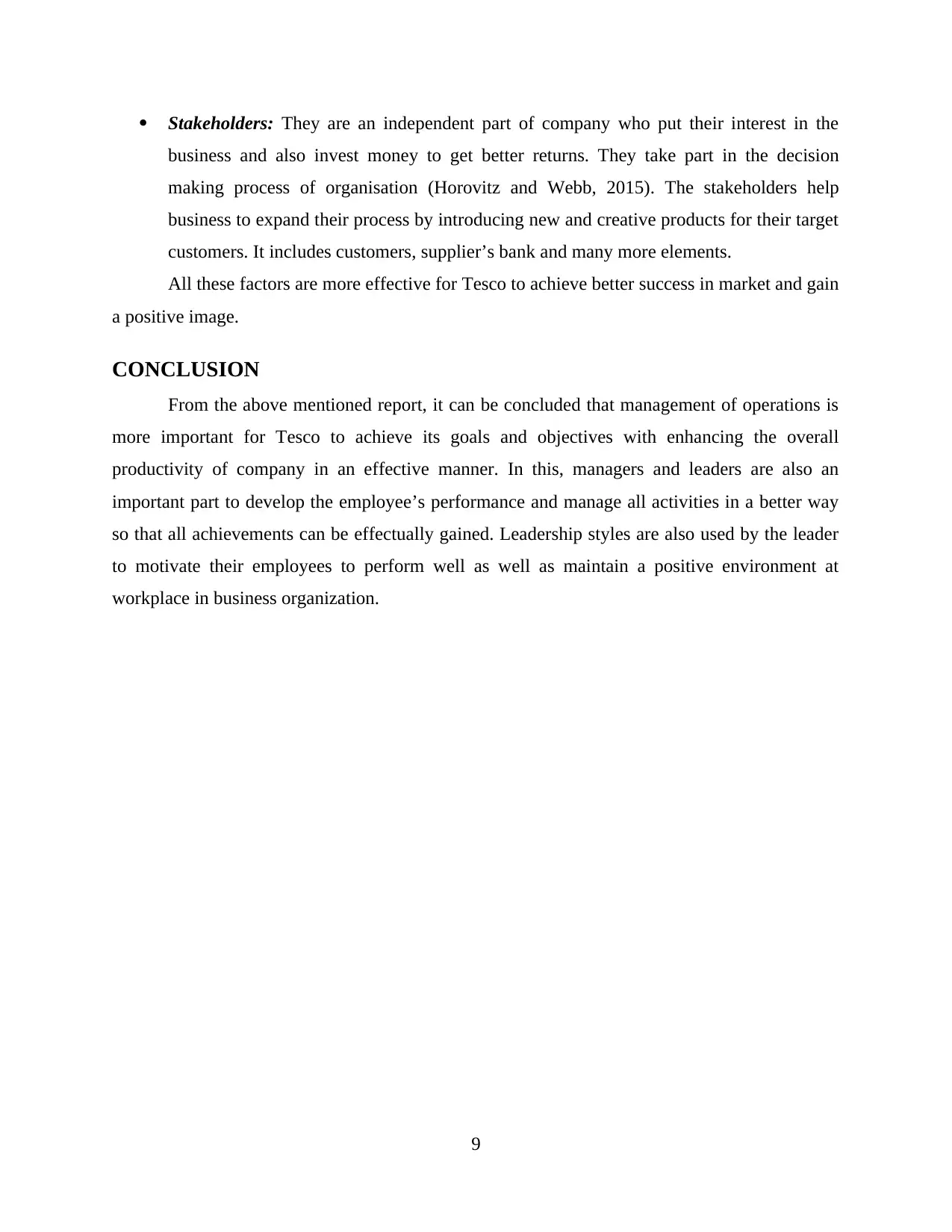
Stakeholders: They are an independent part of company who put their interest in the
business and also invest money to get better returns. They take part in the decision
making process of organisation (Horovitz and Webb, 2015). The stakeholders help
business to expand their process by introducing new and creative products for their target
customers. It includes customers, supplier’s bank and many more elements.
All these factors are more effective for Tesco to achieve better success in market and gain
a positive image.
CONCLUSION
From the above mentioned report, it can be concluded that management of operations is
more important for Tesco to achieve its goals and objectives with enhancing the overall
productivity of company in an effective manner. In this, managers and leaders are also an
important part to develop the employee’s performance and manage all activities in a better way
so that all achievements can be effectually gained. Leadership styles are also used by the leader
to motivate their employees to perform well as well as maintain a positive environment at
workplace in business organization.
9
business and also invest money to get better returns. They take part in the decision
making process of organisation (Horovitz and Webb, 2015). The stakeholders help
business to expand their process by introducing new and creative products for their target
customers. It includes customers, supplier’s bank and many more elements.
All these factors are more effective for Tesco to achieve better success in market and gain
a positive image.
CONCLUSION
From the above mentioned report, it can be concluded that management of operations is
more important for Tesco to achieve its goals and objectives with enhancing the overall
productivity of company in an effective manner. In this, managers and leaders are also an
important part to develop the employee’s performance and manage all activities in a better way
so that all achievements can be effectually gained. Leadership styles are also used by the leader
to motivate their employees to perform well as well as maintain a positive environment at
workplace in business organization.
9
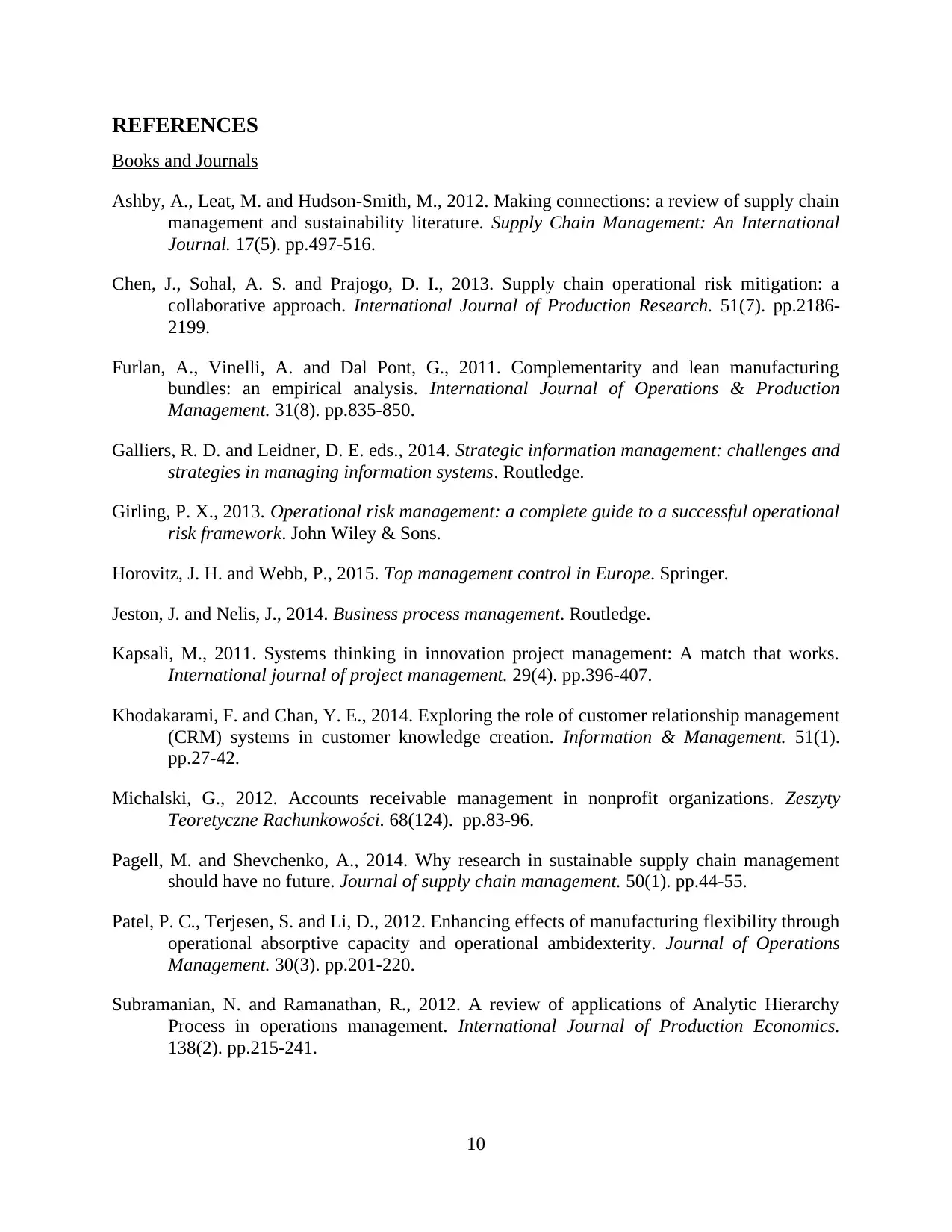
REFERENCES
Books and Journals
Ashby, A., Leat, M. and Hudson-Smith, M., 2012. Making connections: a review of supply chain
management and sustainability literature. Supply Chain Management: An International
Journal. 17(5). pp.497-516.
Chen, J., Sohal, A. S. and Prajogo, D. I., 2013. Supply chain operational risk mitigation: a
collaborative approach. International Journal of Production Research. 51(7). pp.2186-
2199.
Furlan, A., Vinelli, A. and Dal Pont, G., 2011. Complementarity and lean manufacturing
bundles: an empirical analysis. International Journal of Operations & Production
Management. 31(8). pp.835-850.
Galliers, R. D. and Leidner, D. E. eds., 2014. Strategic information management: challenges and
strategies in managing information systems. Routledge.
Girling, P. X., 2013. Operational risk management: a complete guide to a successful operational
risk framework. John Wiley & Sons.
Horovitz, J. H. and Webb, P., 2015. Top management control in Europe. Springer.
Jeston, J. and Nelis, J., 2014. Business process management. Routledge.
Kapsali, M., 2011. Systems thinking in innovation project management: A match that works.
International journal of project management. 29(4). pp.396-407.
Khodakarami, F. and Chan, Y. E., 2014. Exploring the role of customer relationship management
(CRM) systems in customer knowledge creation. Information & Management. 51(1).
pp.27-42.
Michalski, G., 2012. Accounts receivable management in nonprofit organizations. Zeszyty
Teoretyczne Rachunkowości. 68(124). pp.83-96.
Pagell, M. and Shevchenko, A., 2014. Why research in sustainable supply chain management
should have no future. Journal of supply chain management. 50(1). pp.44-55.
Patel, P. C., Terjesen, S. and Li, D., 2012. Enhancing effects of manufacturing flexibility through
operational absorptive capacity and operational ambidexterity. Journal of Operations
Management. 30(3). pp.201-220.
Subramanian, N. and Ramanathan, R., 2012. A review of applications of Analytic Hierarchy
Process in operations management. International Journal of Production Economics.
138(2). pp.215-241.
10
Books and Journals
Ashby, A., Leat, M. and Hudson-Smith, M., 2012. Making connections: a review of supply chain
management and sustainability literature. Supply Chain Management: An International
Journal. 17(5). pp.497-516.
Chen, J., Sohal, A. S. and Prajogo, D. I., 2013. Supply chain operational risk mitigation: a
collaborative approach. International Journal of Production Research. 51(7). pp.2186-
2199.
Furlan, A., Vinelli, A. and Dal Pont, G., 2011. Complementarity and lean manufacturing
bundles: an empirical analysis. International Journal of Operations & Production
Management. 31(8). pp.835-850.
Galliers, R. D. and Leidner, D. E. eds., 2014. Strategic information management: challenges and
strategies in managing information systems. Routledge.
Girling, P. X., 2013. Operational risk management: a complete guide to a successful operational
risk framework. John Wiley & Sons.
Horovitz, J. H. and Webb, P., 2015. Top management control in Europe. Springer.
Jeston, J. and Nelis, J., 2014. Business process management. Routledge.
Kapsali, M., 2011. Systems thinking in innovation project management: A match that works.
International journal of project management. 29(4). pp.396-407.
Khodakarami, F. and Chan, Y. E., 2014. Exploring the role of customer relationship management
(CRM) systems in customer knowledge creation. Information & Management. 51(1).
pp.27-42.
Michalski, G., 2012. Accounts receivable management in nonprofit organizations. Zeszyty
Teoretyczne Rachunkowości. 68(124). pp.83-96.
Pagell, M. and Shevchenko, A., 2014. Why research in sustainable supply chain management
should have no future. Journal of supply chain management. 50(1). pp.44-55.
Patel, P. C., Terjesen, S. and Li, D., 2012. Enhancing effects of manufacturing flexibility through
operational absorptive capacity and operational ambidexterity. Journal of Operations
Management. 30(3). pp.201-220.
Subramanian, N. and Ramanathan, R., 2012. A review of applications of Analytic Hierarchy
Process in operations management. International Journal of Production Economics.
138(2). pp.215-241.
10
⊘ This is a preview!⊘
Do you want full access?
Subscribe today to unlock all pages.

Trusted by 1+ million students worldwide
1 out of 14
Related Documents
Your All-in-One AI-Powered Toolkit for Academic Success.
+13062052269
info@desklib.com
Available 24*7 on WhatsApp / Email
![[object Object]](/_next/static/media/star-bottom.7253800d.svg)
Unlock your academic potential
Copyright © 2020–2026 A2Z Services. All Rights Reserved. Developed and managed by ZUCOL.





